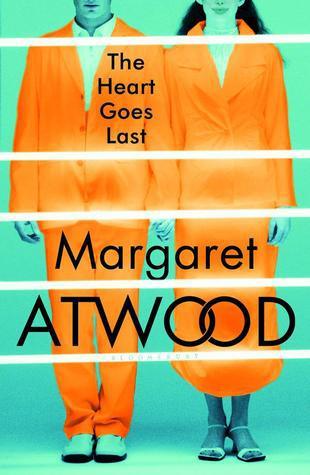B.R. Sanders's Blog, page 15
December 7, 2015
Roundup: November 30-December 6, 2015
Wanderings on the Internet
The Fem interviewed me about writing and life and such!
A couple of new reviews of Ariah came out! I am honored and thrilled!
4 star review over at Twinja Book Reviews
5 star review over by Constance Burris
Writing Update
After winning NaNo, it’s back to The Search! I forgot how many words are in this draft already, gawd. It’s up to 134k. But I’m in the endzone! Big Things Are Happening.
Want posts like this delivered to your inbox? Sign up for my newsletter!


December 4, 2015
Book Review: CHAMELEON MOON
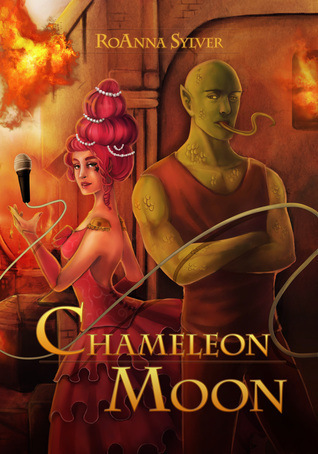
Notes on Diversity:
SO. MUCH. DIVERSITY.
The book follows a tight-knit group of erstwhile superheroes–and most of them are dealing with mental and/or physical disabilities. A number of them are clearly people of color. The main character is a trans woman, and she’s basically the best!! There is am interracial queer poly family that is sweet and functional.
Diversity is firing on all cylinders here. A toast to that.

Review:
What if there was a magic cure-all drug that could fix what was wrong with you?
What if that drug had….side effect?
What if that drug was addictive?
Parole is a city filled with people who, for one reason or another, took a drug to make their lives better. Maybe it fixed something, and maybe it broke something else. Everyone in Parole has a story to tell, and everyone in Parole has their secrets. Everyone in Parole also has powers from the drug they took. Some of those powers, like Jenny Strings’ ability to make the dolls dance, are eerie but harmless. Some of those powers, like Finn’s tendency to accidentally cause explosions when he’s upset, even the slightest bit upset, are…less harmless.
As much as Parole is a city it’s also a prison–walled, fenced, monitored constantly. There are kill lists and secret police. And living in Parole isn’t easy with the constant broiling underground fire. The underground fire threatens to swallow the city whole, and everyone in the city knows that the forces outside Parole won’t step in to save anyone once it goes. But someone in the city has a plan to save it.
The story hinges on the histories of the characters and their present relationships. It’s a character-driven story masquerading as a thriller. Yes, there are fight scenes. Yes, there are epic Walks Though Fire.

like this basically but awesomer
But, really, the tension in the book is derived from character after character coming to terms with their own pasts. What’s beautiful here is how Sylver mines the characters for different narrative arcs. One central character gets redemption. Another gets closure. Another gets to make an admission of love. Still another character’s arc develops beautifully over the course of the book–she has to confront her PTSD, unravel her assumptions about another character, reconfigure her life–but the ending of the book places her in a position that sets up the second book rather than giving her resolution.
I especially loved the rootedness of the characters’ diversity and arcs given that the worldbuilding and conceits of the Parole as a setting were wild. Regan, one of the main characters, is a lizard-man. Rose, another main character, is a plant-woman with prosthetic legs built for her by her wife. The book features a sympathetic zombie named Zilch. Truly weird shit happens in Parole, but the emotional lives of the characters rang very true for me all the way through.
I loved this book. I love that, for once, I as a trans, queer person with disabilities was precisely, squarely the target audience for a book. Holy fuck how cool is that!

me when I realized All The Things about this book
And the book works. Sylver’s writing is tight and quippy. The characters have chemistry with one another. The plot has tension and stakes.
I can’t wait for the next book.

Want posts like this delivered to your inbox? Sign up for my newsletter!


December 2, 2015
#NaNoWriMo: Winner’s Circle!

Yes, it’s all true! With about four hours to go to the deadline, I finished The Analog System, validated it at the NaNoWriMo website, and the draft clocked in at 50,311 words.*
Good god, y’all, I can’t believe I pulled this off. I…don’t really know how I pulled this off, actually. But I did! And now I have a very very rough draft of something new to work with!
There are a monstrous amount of revisions to make. The plotting is uneven. The pacing is atrocious. Why did all the cool characters pop up in the last third of the book? Thanks for showing up late to the party, y’all. Cool. The ending needs more emotional heft.
But YOU KNOW WHAT ALL OF THAT IS FOR ANOTHER DAY. Today is just for basking in the glory of having written 50k-and-change words in 30 days.

*Scrivener says the draft is 50,733 words long but who’s counting? (I am. I am so counting.)


December 1, 2015
Disrupting Publishing Linkspam: 12/1/2015
It’s that time again: that time every week where I round up links to articles written by marginalized people pushing back against oppression in publishing. I’m aggregated as many marginalized voices as possible from as many vectors as possible, and the more intersectional the better. As always if you’ve read something I missed please link it in the comments.
“Goldfinching and Gender Hijacking: Why Can’t Women Have Nice Things In Literature?” by Ceilidhann for Bibliodaze
Altogether, these two incidents reminded me of some pertinent points about publishing, literature and our critical reactions to it that shape the entire ecosystem: Women will be dismissed, even for the works and industries they create, and those works won’t be legitimised until a man appropriates them.
“#AccessibleCons and Geek Socal Fallacies” by Rose Lemberg
It’s not because it’s too difficult, too expensive, it’s not because the fan did not ask nicely or loudly or politely enough. It’s because you did NOT accept them as they are. It’s because you ostracized them. Will you own it?
“Writers Shouldn’t Romanticize Rejection” by Kavita Das for The Atlantic
I’m weary of articles about beloved novels that almost didn’t exist and esteemed writers who almost walked away for good. And while I’m genuinely happy and grateful for the voices that make it through to be published and am thrilled when they receive well-deserved rewards and recognition, I know they are the slim exceptions, and that this is particularly true of writers of color.
“Do Black Children’s Lives Matter If No One Writes About Them?” by Daniel Jose Older for The Guardian
In a situation that will be familiar to many writers of color, author Dhonielle Clayton recently had a Young Adult book rejected in part because the publishers already had a book with a black character in it. “I’m finding that there’s still a one book per list rule, or a few books per list rule where they fill their quota of diverse content and then that’s it,” Clayton told me. “They’ll say, ‘We already have our Asian book, our black book,’ and that’s that.”


November 29, 2015
#NaNoWriMo: When Murphy’s Law Is Your Friend
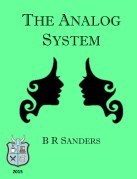
current word count: 47, 061
I’ve written before about how I’m more of a character-driven writer than I am a plot-driven writer. I’ve also written before about how my NaNo project is great uncharted territory for me. Part of that is because it’s a plot-driven novel. Not to say characters aren’t core to the plot! They are! But it is definitely a book where characters go and Do Things. Thus, the outlining.
I am in the end zone. I am so close to winning NaNoWriMo I can taste it. And I am close to winning because of a two-step process:
scope out my characters’ ideal end zone plan*
break that plan (thereby introducing Compelling Complications)
Part 1: How The Plan Should Have Gone

In an ideal world, disarming the mad scientists should be a cakewalk.
So, I have to confess in the outline this part was…sketchy at best. I had a sense of where I was going, but it wasn’t that fully fleshed out. It was more like “and then the main character and some other people do some stuff to get rid of the bad dudes and voila! an ending.”
This meant I had to stop writing partway through the draft and figure my shit out. What did my characters want? Why did they want that? What would make sense in their context? If I was in their shoes, what kind of plan would I make?
I sketched it out, and that gave me a direction through the end of the book!
Or so I thought.
Part 2: Perfectly Executed Plans Are Boring

You have more questions now than you would have if she had just lifted it, right? Now you want to know if she’s ok, what happened to the shoe, etc.
Complications add conflict, and conflict is the lifeblood of any narrative. Yes, it would be satisfying for me if I just wrote my main character’s plan going exactly as she hoped–I like her and want her to succeed!
But it would be kind of boring to read, actually.
The thing that keeps me reading a book is when things don’t go according to plan. I want to see how characters will fix a broken plan, what they will do when thrust into situations they aren’t expecting. And also? How often of your mundane, everyday plans are executed exactly as you sketched them out? I was almost late for the movies this morning because my partner ran the gas tank down to E and the dang light was on and then the first pump I was at had a bum card reader, so then I had to go to another one, eating up more precious minutes of possible Hunger Games viewing time. And that was just going to see a movie! So in a life-or-death planning situation, even when you’re super-extra-careful, life still has a way of throwing you curveballs.
I added some curveballs. It’s making this last bit of the book much more satisfying to write.
*Many thanks to Shveta Thakrar for enduring gchat brainstorm sessions with me as I worked out this part.


November 25, 2015
#NaNoWriMo: Hello, Evernote
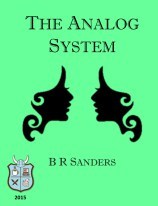
Current word count: 41, 392
Worldbuilding while writing something, for me, is very much like building the plane while flying it. It’s terrifying, and ill-advised, and a situation where, at the very least, you really need to be keeping really excellent track of what you have or have not done lest you miss a Very Important Step and wind up crashing and burning.
For the world of Aerdh, where my other novels are set, worldbuild, and then I write. It’s a very clean, linear process. Tidy. Orderly. I have a separate Scivener file that is solely for Aerdh worldbuilding.
So. I’m drafting The Analog System in Scrivener, which looks like this:
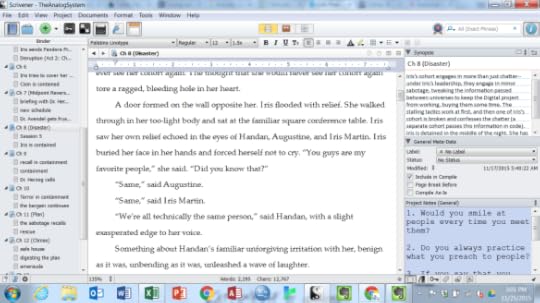
I started with the intent of worldbuilding in the same Scrivener file as I was writing in. That’s what I do for short stories; I just create a little research folder outside the main draft and stick ideas and outlines and other shit in there as needed. It works great!
But it didn’t work great for The Analog System. Maybe it was a matter of scale. It got unwieldy moving back and forth within the same big document like that around Chapter 4.
I realized I needed something quicker, something external, where I could keep my notes (in digital format), where I could pull them up and refer to them without losing my place in the current draft of the actual story. BUT it had to be a program that had a lot of organizational potential because I like to fiddle with my notes a lot when I’m stuck, categorizing them and recategorizing them and adding to them, etc., as a way to un-stick my mind. AND it had to have the capacity to work offline since I’d need to add to the notes and things while writing on the bus.
Evernote. Evernote totally fulfills all these criteria.
I am just barely off track word-count wise right now in NaNo, and I can pretty much credit Evernote and some awesome writing buddies to that fact. Without Evernote, I’d be searching through my draft for a bunch of names and descriptions. Evernote is totally the backend of my book right now and it is working so well. For me, it looks like this:
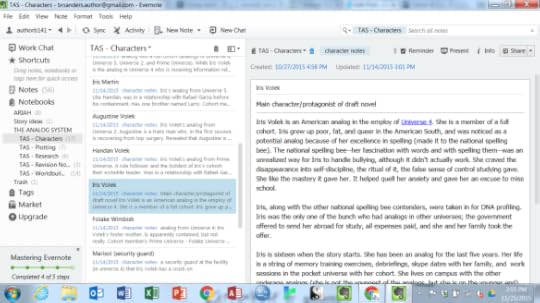
I’ve got a bunch of Analog System – related notebooks stuck in a notebook stack: one for character sheets, one for plotting, one for research (yay, webclipper!), one for worldbuilding notes, and one for notes on revisions*.
A LOT of my backstory is in Evernote right now instead of the book’s draft, which is a good thing! There’s still way too much exposition in the book, but that means there’s even less to cut in the revisions.
As always, do what works for you, but the two-fer of Scrivener and Evernote is really working for me right now.
*Yeah, already planning for the revision.


November 4, 2015
#NaNoWriMo: I Made An Outline For This
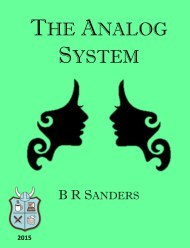
Current word count:
I used to be very hardcore about outlining. In college, I outlined my papers on half-sheets of paper and then taped those outlines to the monitor of my computer to keep them in my field of vision as I worked. I first got into fiction writing by helping to outline someone else’s1 project. And when I first finally started writing fiction by myself, I outlined in minute detail–every beat, every breath, every break.
I still outline short stories, actually, roughing out the beats before I start the actual writing, but I haven’t outlined a novel in years. I didn’t outline Ariah or Resistance at all. But with my NaNoWriMo project, The Analog System, I don’t have the luxury of working in a universe I’ve defined yet. I did some worldbuilding, some basic foundation laying, in October, but I also actually outlined a plot. Start all the way to finish.
Potential spoilers in these cards, FYI
It was hard. I am rusty. I kept getting stuck, so then I’d do some more worldbuilding, or flag questions I needed to research about worldbuilding, or else-wise procrastinate. I ended up googling “novel three act structure” because, hell, I don’t need something fancy for a first draft, just something tried-and-true, something serviceable.I came across a helpful post at Janice Hardy’s Fiction University and forced my way through it.
It felt weird defining the plot before I knew all the ins and outs of the universe. It felt even weirder making plot decisions before I knew who the cast of characters would be. But I didn’t want to sprint my way into a dead end with NaNoWriMo. I needed a road map for this one.
It felt very weird, but I did it. Now, let’s just see if I follow it.
1That project was my partner’s short story, which eventually turned into the world of Aerdh. The most direct descendant of that fateful initial short story is probably Cargo.


November 3, 2015
Disrupting Publishing Linkspam: 11/3/2015
It’s that time again: that time every week where I round up links to articles written by marginalized people pushing back against oppression in publishing. I’m aggregated as many marginalized voices as possible from as many vectors as possible, and the more intersectional the better. As always if you’ve read something I missed please link it in the comments.
“Equity in Publishing: What Should Editors Be Doing?” by Antonio Aiello for PEN
ALEXANDER CHEE: I guess I’m still stuck on this “white nepotism,” “brown nepotism” idea Sherman Alexie has left us with—in which he mistakes white supremacy for nepotism, and the work to undo it for another kind of nepotism. I am still trying to see the good in what Alexie has done, but I can only think that while he has indeed defended his choices, and perhaps, the way those choices were made, he has done so at the cost of approximately 100 years of writing and activism by Asian American writers, who have, at sometimes considerable social and professional cost, worked to pry open even a little of the white Potemkin village that is contemporary American publishing.
Poet Gregory Pardlo: ‘I won the Pulitzer: why am I invisible?’ by Angela Chen for The Guardian
“One of the things I run into surprisingly often is people saying to me, ‘I’ve never heard of you before,’” says poet Gregory Pardlo. “Yet I’ve been publishing in ‘mainstream’ journals and my book won that prize, so what is it that is making me invisible? It’s not the work and it’s not the publishing credits.”
“This Is Getting Old” by Katherine Locke
Bird, unlike Breslin, isn’t anti-Semitic. Just determinedly tonedeaf about marginalized people’s hurt and their right to protect themselves and express the hurt at the same time. But suggesting that marginalized people must be hurt, must continue to be hurt, must make themselves open to hurt in order to converse is cruel, unnecessary, and wrong.
“12 Fundamentals of Writing ‘The Other’ (And The Self)” by Daniel Jose Older for Buzzfeed
To write, we must listen. To listen, we must shut up. And this isn’t the simple kind of listening, where you’re waiting for them to finish what they can say so you can jump in real quick with your point. Really, have a seat, take a deep breath, and listen to what people around you are saying. Listen to yourself, your quiet self. To your doubts and fears, the things you don’t want to admit. Listen to the things folks say that make you uncomfortable. Sit with that discomfort.


November 2, 2015
NaNoWriMo 2015!
I’m doing NaNoWriMo this year!
I’ve never done it before. It’s funny, because when I told my partner I was doing it she looked at me cock-eyed and said, “right, because you really need a special project to make you write more.”
But I do. Let me explain:
I’ve had this nugget of a piece of a cool sci-fi concept bouncing around my brain for a while now. Maybe a year and a half? Maybe almost two years? A while. But I haven”t found the time to develop it or the right way to do it. Meanwhile, I keep writing other stuff.
A few weeks ago I realized this kernel of an idea was actually sprouting into a novel. And I realized that though I’ve written…nine-ish novels (many of which are unpublished) all of those novels are set in Aerdh–the same universe as Ariah and Resistance.
I had myself half-convinced that I could not actually write a novel that was not set in my familiar, stalwart universe of Aerdh. It’s my safe space as a writer. But I don’t want to just hang out in my safe space forever; I want to stretch and grow, too. The nice thing about something like NaNoWriMo is that it’s a dedicated time and space to try something different. With NaNo, I’m more or less giving myself permission to step away from the current projects I have going and try this new, unfamiliar, exciting thing I’m afraid to fail at.
Worst case scenario is that I scrape some words out of my brain and throw them in Scrivener and they don’t make any sense.
Best case scenario is that I take a rough pass at something currently out of my comfort zone and eke out something revision-worthy.
Wish me luck! Ok, now for the big reveal. Here’s what I’m working on for NaNoWriMo:
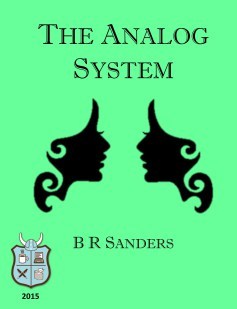
This is a working title. I am so bad at titles, y’all. Anyway, you can follow my updates on twitter or over on the NaNo website!
Iris Volek is an analog serving Universe 3. Chosen for her prodigious memory, at sixteen Iris is one of the few people in the world who can enter a pocket universe and converse with people from parallel universes: her other selves born into worlds where history took different turns. But suddenly the other analogs around her start to disappear—taken into “containment” by the powers that be. And Iris knows that once an analog is “contained” they never come back. Iris must find out why the analogs are disappearing and stop it—because she might be “contained” next.
October 30, 2015
Book Review: THE HEART GOES LAST
Notes on Diversity:
If you’re looking for a diverse read, look elsewhere.
I can’t remember a single character in the book who isn’t white. All of the characters are able-bodied. Due to economic collapse, characters in the opening struggle with poverty but it is noteworthy that they did not start out that way–this is a story about middle class people descending into squalor (how terrible!), then making horrible compromises to creep back out of the pit of violent poverty again. It is not a story about people who have always been impoverished.1
The book, I think, aims to establish an odd kind of solidarity with queer readers by way of a kind of essentially ironic heteronormativity,2 but the effect, for this queer reader at least, was disheartening. One of the main characters reflects:
Anything goes, out there in the so-called real world; though not inside Consilience, where the surface ambience is wholesomely, relentlessly hetero.
But it’s not clear why. Later on in the book, this same character leaves Consilience, due to plot contrivances, and winds up in a heard of Elvis impersonators in Las Vegas, all of whom appear to be interchangeably gay. But, lo! They are not gay. They just pretend to be so, for reasons, because that isn’t problematic at all.
So, not only is there no authentic queer representation in the book, in one locale it’s explicitly mysteriously absent, and in another, queerness is co-opted and appropriated. Both instances left a very bad taste in my mouth.
Review:
I should say right at the outset that Margaret Atwood is one of my favorite writers. She has historically been an auto-buy for me, so when I heard she had a new novel coming out, I pre-ordered it, no questions asked.
I regret it.
The truth is that The Heart Goes Last is not very good. I would recommend fans of Atwood read this engaging interview with her about the book instead of reading the book itself–seriously, skip the book. Everything Atwood wants to say about prisons and commodification she says more succinctly and with more wit in this interview.
*Sigh.*
The plot of The Heart Goes Last is as follows: there is a terrible economic collapse in America (kind of3) which leads to a middle class White hetero couple, Stan and Charmaine, losing their jobs and living in their car. Stan and Charmaine escape their grubby car-life by signing up for a planned community called Consilience. The deal with Consilience is that residents of Consilience get a house with fluffy towels and a fridge and TVs that play Doris Day movies, but the catch is that every other month they have to serve a term as prisoners in the Positron prison. As civilians, everyone has a job and a secure living arrangement, and then as prisoners, everyone chips in to do the grunt work that keeps the community going. The rotating population also shares housing–so, when Stan and Charmaine are in Positron Prison, a different couple (their Alternates) life in their designated house.
At first things are nice. And then, everything goes to shit. What first begins as a fairly mundane extra-marital affair4 spirals out into a frankly unbelievable conspiracy involving organ harvesting, lobotomies, and sex robots. As Stan and Charmaine are drawn deeper and deeper into the seedy underbelly of Consilience/Positron, each of them becomes pawns in someone else’s game. Ultimately, Atwood raises questions of free will in a forced, haphazard way that decidedly did not work for me. Maybe it will for you.
I found the book deeply unsuccessful. On the one hand, I think Atwood tried to do too much with it; maybe the book should have only focused on lobotomizing-women-so-they-become-sex-slaves or just on the complicity-we-all-have-with-regard-to-mass-incarceration. And in either case, taking on these subjects in a book written as a tongue-in-cheek absurdist romp rubbed me the wrong way.
Here is what I mean. In an interview, Atwood says the following about setting her book mostly in a prison:
The Millions: The set up of your novel felt so real.
Margaret Atwood: It is real.
The Millions: But it’s not necessarily your reality.
That’s my issue–Atwood is a massively privileged person. She has not been to prison. She is at a remove here. Given the scope and the viciousness with which incarceration can derail a person’s life, I think it’s inappropriate to treat it lightly, especially if it is not the writer’s reality. The entire book is flippant, frankly, which is why if didn’t work for me.
Atwood is a brilliant women. I deeply respect her. But I am uninterested in reading a book about how prisons are absurd and bad written from this removed and very privileged perspective. It’s fascinating, actually, considering that one of her previous novels, Alias Grace, did interrogate crime and imprisonment from a feminist perspective quite successfully.
The Heart Goes Last took Atwood from an auto-buy author for me to someone I now side-eye. What a shame.
1I make this distinction because, in my experience, growing up poor and becoming poor as an adult are two distinctly different experiences. When you grow up poor there are things you never learn, elements of social capital that are forever out of your grasp. When you slip down the class ladder later in life you can often still “pass” because you were enculturated with these elements of social capital from an early age. It still sucks, but it’s different, and it is one thing that makes later-in-life poverty actually easier to escape than starting there.
2I would draw a parallel here to the kinds of deeply offensive “hipster racism” or “ironic racism” that are, at bottom, just racism.
3I’m calling a Plot Hole here: it doesn’t make sense to me that large swaths of America would be in total economic collapse but Las Vegas would be just fine. And Consilience/Positron is apparently turning a tidy profit–but who is buying if the entire economy has collapsed? If most of America’s middle class wound up sleeping in cars then how are the Elvis impersonators squeaking by? The economics in the book truly did not make sense to me, and since Stan and Charmaine’s actions are driven by this apparent economic collapse, I really needed to buy into it.
4Honestly there are few plots I find more boring than middle-aged-middle-class-hetero-married-couple-falls-into-affairs-out-of-ennui-and-boredom. This plot thread when on way, way, way too long.
Want posts like this delivered to your inbox? Sign up for my newsletter!



![CropperCapture[155]](https://i.gr-assets.com/images/S/compressed.photo.goodreads.com/hostedimages/1446724605i/16883805._SX540_.png)



